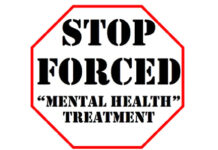Hearing Voices Researched at Edinburgh Book Festival
Researchers from Durham University's Hearing the Voice project are attending the Edinburgh International Book Festival through August as part of a study, asking both...
Medical Science Argues Against Forced Treatment Too
The argument that is usually made against involuntary commitment and forced treatment is that these actions, under the authority of a state, violate a person’s basic civil rights. They deprive a person of liberty and personal autonomy, and do so in the absence of a criminal charge. However, there is another argument, one of adjunctive value, that can be made against involuntary commitment and forced treatment. Medical science argues against forced treatment too.
Call to Action: Massachusetts Benzodiazepine Bill is Going to Committee
The Massachusetts Benzo Bill H4062: Informed consent for benzodiazepines and non-benzodiazepine hypnotics was just scheduled to be heard by the Joint Committee on Mental Health and Substance Abuse on Monday, April 4th. Less than a week away! The committee will decide whether the bill moves forward to the house and senate, goes to study, or is denied.
Hearing Voices Workshop Comes to Vermont
I recently had the great pleasure of hosting a Hearing Voices workshop with Ron Coleman and Karen Taylor. The response was overwhelmingly positive. Many people described this as one of the best trainings they had ever attended. Ron's message is inherently uplifting - after all this internationally known educator was once a mental patient given a poor prognosis. But in addition, they offered pragmatic suggestions for how to think about voices and talk to someone who is experiencing them.
Inner Fire: Healing and Recovery Without Meds
For five years, I and others worked to create a residential healing community in Brookline, Vermont, where people could recover from debilitating and traumatic life experiences, which often lead to addiction and mental health challenges, without the use of psychotropic medications. We welcomed our first six seekers to a yearlong, therapeutic and farm-based, day program last September, and we now can report on what we have learned during this time.
Mental Health Advocacy in California: Perspectives of Advocates and Decision-Makers
In partnership with the California Association of Mental Health Peer-Run Organizations (CAMHPRO), Live & Learn, Inc. conducted a survey on the impact of stakeholder advocacy on decisions affecting public mental health systems in California. The objective was to pilot an approach to help CAMHPRO evaluate the impact of consumer advocacy in the state and to document the activities that advocates engage in (e.g., legislative testimony, demonstrations, campaigns).
Only 72 Hours Left to Say #FDAStopTheShockDevice
As part of the effort to stop the down-classification of the shock device, on March 24, 2016, people who are psychiatric survivors, shock survivors, allies, and MindFreedom International members sent a 47-page public complaint to the FDA Ombudsman Office and Medical Devices Ombudsman concerning the FDA's attempts at down-classifying the shock device. Here are some excerpts. Please sign the petition and add your support to our growing strength!
Changing the World and Other Extreme Sports
By Dani, Director at Afiya
For anyone who’s unfamiliar, Afiya is the first peer-run respite in Massachusetts and it is one of only about 18 in the country. It’s no surprise, then, that people are confused about how we do things. But, it’s not just confusion. I’ve come to realize there is actual defensiveness that arises at times when we talk about what we do at the house. If I’m wearing my activist hat, this can be supremely annoying.
Prescripticide: A Proposal for Action and a Request for Your Help
The primary factor protecting psychiatry’s unwarranted power and authority is that it is perceived as shielding society from folks who are believed to be dangerous. It would seem, then, that one logical step toward reducing society’s trust in biological psychiatry would be to reveal the evidence of a significant correlation between the use of prescribed psychoactive drugs and the commission of violent acts against oneself or others.
Upon Leaving Soteria-Alaska
Soteria-Alaska, a program modeled after the highly effective Soteria developed in the 1970s by the late Loren Mosher, M.D., opened its doors in 2009. It is also impossible to convey the actual simplicity which in fact is the crowning jewel of the Soteria approach. A conservative review of the effectiveness of the Soteria approach revealed that it is at least as effective as traditional hospital-based treatment — without the use of antipsychotic medication as the primary treatment. Considering that people treated in the conventional way die on average 25 years younger than the general population, this is a substantial finding.
Drugging Foster Kids: Let’s Do Something About It
This is an invitation to action. Mad in America readers know that psychotropic medications, especially “antipsychotics,” often are used to sedate and restrain problematic people, including children—and not just any children, but foster children especially, and most of all, foster children in so-called “group homes.” Agreement is widespread that foster kids are over-medicated: too many, too young, too many drugs per child, on dosages that are too high and are maintained too long, oftenyears on end. The PsychDrugs Action Campaign of the National Center for Youth Law invites Mad in America readers to join us to make positive changes now.
ECT Day of Protest: Time for You to Take Leadership
Work on the May 16 International Day of Protest Against Shock Treatment is moving right along. This spontaneously-organized, grassroots effort now includes 21 cities in 16 states, plus two each in Canada and the United Kingdom. There will also be demonstrations in Ireland, New Zealand, and Uruguay. We CAN win, and you CAN be a leader.
And They Said it Wouldn’t Last – Rethinking Psychiatry Celebrates its 7th Year
Rethinking Psychiatry is proud to continue the work that began in 2010 in Portland, and we look forward to many more years of challenging the dominant paradigm in mental health and providing new perspectives and solutions.
CRPD Absolute Prohibition Campaign and Course
For a long time I have been interested in offering a course on CRPD (Convention on the Rights of Persons with Disabilities) to pass on my knowledge to other activists and allow more people to take up the frustrating and passionate responsibility of human rights work. Finally I have come up with a plan that is doable.
All Real Living is Meeting
In recent weeks I have taken part in some very powerful meetings at my work place, the Family Care Foundation. By "powerful" I mean that they have been both moving and demanding, Many people who did not know about us before seeing Daniel Mackler´s movie, Healing Homes, have contacted the Family Care Foundation looking for a place where it is possible to get off pharmaceuticals, and to be supported. Even more importantly, they are longing for a place where they are met as a human being, amongst other human beings.
Moving Forward in the Science of Psychiatric Medication Discontinuation/Reduction
This week Live & Learn launched a research study on the experience of people labeled with mental disorders who have tried to stop taking psychiatric medications. This project -- the Psychiatric Medication Discontinuation/Reduction (PMDR) Study -- aims to understand the process of coming off psychiatric medications in order to better support those who choose to do so. The study seeks to answer the question: What helps people stop their psychiatric medications? What gets in the way of stopping?
Hearing Voices Network Launches Debate on DSM-5 and Psychiatric Diagnoses
The recent furore surrounding publication of the new DSM has provided a much-needed opportunity to discuss and debate crucial issues about how we make sense of, and respond to, experiences of madness and distress. Many psychiatrists, psychologists and other mental health professionals have expressed their dismay about the dominance and inadequacy of a biomedical model of mental illness. Whilst we share these concerns, welcome these debates and support colleagues that are willing to take a stand, The Hearing Voices Network believes that people with lived experience of diagnosis must be at the heart of any discussions about alternatives to the current system.
CHOICES Back on Track
Last year I reported that CHOICES, Inc. had lost its way and was implementing an ACT team. There is no doubt in my mind that CHOICES was on the wrong path, but the new Executive Director is committed to getting CHOICES back to a peer-run program.
40 Days to Tell the #FDAStoptheShockDevice
Please join us in demanding that the FDA stop the shock device from being down-classified to a Class II device. We have until March 28th, 2016.
Challenging the Ongoing ICD 10 Revision: How You Can Help
Mental health policy does not sound exciting. It is - you’ll just have to take my word for it-, but even if you don’t, you might agree with me that it’s crucial. Mental health policy shapes mental health legislation, and mental health legislation shapes issues such as consent, access, equal opportunities and de-institutionalisation, to name but a few. Influencing policy is key to reframing the debate around mental health, and changing the reality on the ground for people with lived experience. With this in mind, here is an introduction to Mental Health Europe’s work on the revisions to ICD 10, and a call to action, for you to get directly involved in this international debate.
Call to Action: Support a Bill for Informed Benzodiazepine Use
Massachusetts Bill HD 4554 needs to gain sufficient state representative support by Tuesday, March 1, 2016. This bill will put restrictions on the prescribing of benzodiazepines and non-benzodiazepine sleep aids, and will require that all patients be informed of the potential dangers of these drugs, specifically the dangers of long-term use.
Bipolarized and Crimes Against Nature
Rethinking Psychiatry recently hosted a showing of the award-winning film 'Bipolarized.' The film criticizes both the mainstream mental health system and societal standards of masculinity. The author of this post draws parallels to the film and the one-man show "Crimes Against Nature," in which psychology professor Dr. Chris Kilmartin critiques traditional standards of masculinity as harmful and unrealistic.
“Hearing Voices: The People Who Say Talking Back is the Only Answer”
Journalist Emma Reynolds profiles Amanda Waegeli, Ron Coleman, Nathan Grixli and Lyn Mahboub about their experiences coming to the Hearing Voices Network (HVN). HVN was established 10 years ago in Australia and provided a support group that encouraged people to listen to their voices rather than trying to block them out. The group now operates in 25 countries.
Will the European Elections Be a Chance for Mental Health?
European citizens from 27 different countries will soon go to the polls to elect their representatives in the European Parliament for the next five years. As an advocacy organisation, we see those elections as an opportunity to call on current and future European leaders and policymakers to bring mental health to the heart of European policies.
Disobedience: What Can We Risk?
It is possible to heal, and at the same time healing also means restoring the part of oneself that can face violence and disobey to protect what is most sacred. I am that sacred, and so are you.















